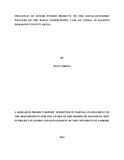| dc.contributor.author | Tott, Gibson | |
| dc.date.accessioned | 2013-08-12T09:29:02Z | |
| dc.date.issued | 2013 | |
| dc.identifier.citation | Master Of Arts In Project Planning And Management, University of Nairobi, 2013. | en |
| dc.identifier.uri | http://erepository.uonbi.ac.ke:8080/xmlui/handle/123456789/55781 | |
| dc.description.abstract | This research sets out to assess the effects of donor-funded Projects on the social-economic
welfare of the rural communities in the Elgeiyo Marakwet County in Kenya located in the
Northern part of Rift valley. The research is on a technical assistance program named CADSAL;
a program that was bilaterally funded by the government of Kenya under the ministry of
agriculture and JICA, a Japan international development agency. The projects aimed at
increasing productivity of the targeted groups and generally create sufficiency. To achieve this,
the project employed two approaches namely Community Initiative project (CIP) and
Community Participatory Technology Development (CPTD). Under CIP, the community groups
came up with their own projects using participatory method with technical and financial
assistance from CADSAL. The choice to conduct research on this organization was based on the
fact that it had successfully implemented more CIPs and CPTDs than any other NGO that ever
operated in that region. The researcher is set out to ask the following questions: Did CADSAL
level of funding had an influence on the community social-economic welfare through CIPs and
CPTDs projects? To what extent can the social-economic welfare of the community be attributed
to the management of CADSAL program? What relationship existed between capacity building
of community groups and sustainability of CADSAL community projects? How important was
stakeholder involvement in successful implementation of CADSAL programs? To answer the
above questions, Simple random sampling method was conducted and descriptive survey used to
gather information, analyzed using SPSS v17.0 and presented using percentages, frequencies,
cross tabulation and correlation. Research findings showed that level of funding, stakeholder
involvement, management and capacity building had an influence on the social economic
welfare of CADSAL beneficiaries. The study finally recommended that donors build on the
already established rural capacity to achieve higher impact. | en |
| dc.language.iso | en | en |
| dc.publisher | University of Nairobi | en |
| dc.title | Influence Of Donor Funded Projects On The Social-economic Welfare Of The Rural Communities: Case Of Cadsal In Elgeiyo Marakwet County, Kenya | en |
| dc.type | Thesis | en |
| local.publisher | Department of Extra Mural Studies | en |

